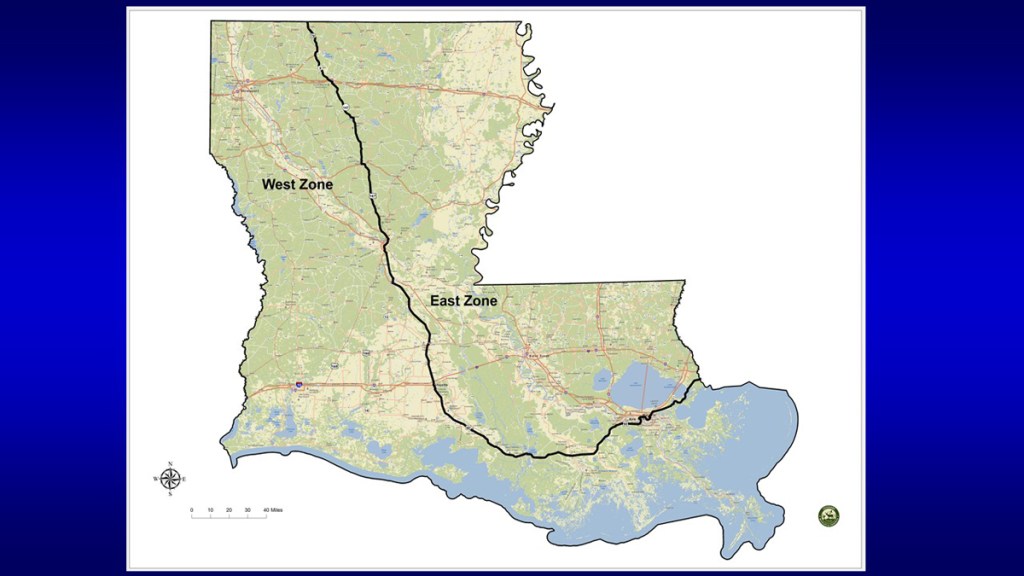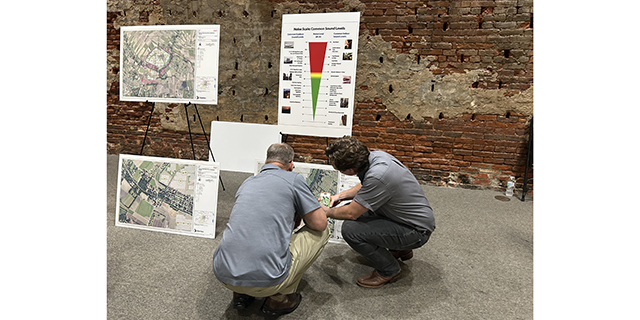State’s waterfowl study leader proposes two zones, two splits
Published 8:30 am Sunday, August 16, 2020

- The state Department of Wildlife and Fisheries map shows the dividing line for the East Zone and West Zone proposed recently by Louisiana waterfowl study leader Larry Reynolds.
BATON ROUGE — Two zones, two splits, anyone?
That’s the proposal for waterfowl hunting seasons from 2021 to 2025 made Aug. 6 by Larry Reynolds, waterfowl program manager for the state Department of Wildlife and Fisheries. Reynolds gave his presentation to the Louisiana Wildlife and Fisheries Commission.
His recommendation, which puts the coastal areas of the state in a newly designed West Zone, gives him the flexibility to make future parameters for duck hunting seasons in the Sportsman’s Paradise.
He’s waiting on the state’s duck hunters to give him some feedback before the commission takes up the recommendation at its meeting on Sept. 3. As of Thursday, Reynolds received less than a dozen public comments.
“I have received 11 public comments since I gave the presentation on Thursday. So it’s been a week. That’s not a big response. Normally, what that means is people are OK with it,” Reynolds said.
Well, all but two so far. But more about that later.
Perhaps, he said, distractions associated with the coronavirus pandemic are to blame for the low response. He also wondered aloud if fewer lines of communication are responsible, or how thoroughly word of the proposal is being spread.
“I expected more of a reaction from the rice-growing parishes — Jefferson-Davis, Acadia and Vermilion parishes because the recommended proposal puts them in with the coastal zone rather than the East Zone, where they’ve been the last four years,” he said. “But that’s what the survey showed. Fifty-seven percent favored being reconnected with the coastal and West Zone and only 43 percent favored being in the East Zone.”
Farther east, he’s heard from those who are unhappy.
“I’ve got a few, a couple, two of 11, responses not happy with southeast Louisiana, especially Terrebonne, staying with the southwest zone. Those two hunters who responded to me wanted to be moved to the East Zone. But the majority of comments favored the recommendation,” the state’s waterfowl leader and veteran waterfowl biologist said.
The lone duck hunter in the state who’s opinion doesn’t count is Reynolds.
“Personally, I’m the one guy in the state not allowed to have an opinion. Everything I do in this state has to be supported by (federal waterfowl harvest since 2000) data (and hunter preferences via surveys). Whatever the season dates are, I’m going to go hunting,” he said.
And the response to the waterfowl hunting survey, a chance for duck hunters to let him know what they want, was pitiful this year. He didn’t have a whole lot to go on.
The 2020 Louisiana Waterfowl Hunter Survey results helped determine his recommendation. There was no overwhelming percentage favoring the options — none more than 50 percent.
For example, 30 percent wanted three zones and one split, 30 percent wanted two zones with two splits, 30 percent had no opinion and 10 percent wanted something different, he said.
“There’s no way I can make the majority (of state’s duck hunters) happy. I follow the data the best I can,” he said.
According to a prepared statement released a day after the meeting, LWFC commissioners also may consider other boundary options presented by Reybnolds. To see his presentation, which includes other zone options, go to www.wlf.louisiana.gov/assets/Hunging/Waterfowl/Files/Zones-splits-August-Commission-pesentation.pdf.
If duck hunters want to comment on the recommendations, contact Reynolds at lreynolds@wlf.la.gov or (225) 765-0456. To get in touch with LWFC commissioners, go to www.wlf.louisiana.gov/page/commission.
New waterfowl hunting zones would go into effect 2021-22 and continue through 2025-26.
The 2021-22 waterfowl hunting zones can be seen at www.wlf.louisiana.gov/page/seasons-and-regulations.
Reynolds said, “Right now, the way I see it, I think the commission is going to approve it (his recommendation).”
But, he added in the same breath, anything is possible.
There are advantages to two zones and two splits that many duck hunters may appreciate, he said. He can give the ducks a rest between duck hunting action twice with three openers in each of the two zones.
The Sportsman’s Paradise’s duck hunters hunted two zones from 1975 to 2011. The state went to three zones in 2012.
“If I could have two splits, I can use another split after the New Year’s holiday. I’d have a chance to give birds a break,” Reynolds said.





